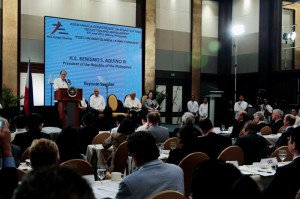
By Azer N. Parrocha
MANILA, June 5 (PNA) — With tragedies caused by climate change becoming more frequent, devastating and larger in scale, President Benigno S. Aquino III on Thursday stressed the need to do more to reduce the risks due to natural disasters.
Speaking before delegates at the Asia-Europe Meeting (ASEM) Manila Conference on Disaster Risk Reduction and Management held at the Diamond Hotel, the President said it is about time the government be more focused in addressing these threats.
“This is why we are here today: Because we all agree that we cannot sit idly by as the effects of climate change worsen,” President Aquino said.
“It is vital — now more than ever — that we mount a focused, international effort to address the threats posed by climate change, and to build communities that are resilient in the face of disaster,” he added.
The President further said that it has become increasingly necessary for the government to convene and to share best practices, and, by doing so evolve as one international community in addressing a common problem.
Lessons learned
The Chief Executive shared some lessons gained after the country was hit by typhoon “Yolanda” (Haiyan), among other strong typhoons which not only took the lives of thousands of Filipinos and affected millions more.
“In the last 20 years, we have observed an increase in the number of typhoons entering our Visayas and Mindanao regions,” the President said, citing typhoons Washi in 2011, Bopha in 2012 and Haiyan in 2013.
“This is precisely why, instead of simply being reactive, our administration has always taken a proactive approach to reducing the risks posed by natural calamities,” he added.
He said that from Day One, the government undertook the large-scale enhancement of its scientific capabilities— acquiring positioning Doppler radars to better estimate the amount of rainfall brought about by incoming cyclones.
He also said that the government also launched a project called NOAH, or the Nationwide Operational Assessment of Hazards, which involves integrating the early warning systems along 18 major river basins, installing hundreds of so-called hydromet devices across the archipelago.
It also put up a website that enabled anyone with an internet connection to access real-time weather information, map the topography of floodplains and river basins through LiDAR technology and prepare multi-hazard maps that identify areas that are prone to flooding, landslides, tsunamis, among other calamities.
The President also cited the government’s efforts to train personnel working with the local communities in the use and maintenance of these new technologies and finding ways to make it easier for all Filipinos to act on the information made available to them.
“These, among other initiatives, demonstrated our resolve to maximize the impact of technology on improving the resilience of our communities,” President Aquino said.
“On top of these, our administration also made a habit of anticipating needs,” he added, noting how the government has also studied the projected paths of every incoming storm and prepositioned assets in safe and nearby locations, so that help can arrive to affected areas in the quickest possible time.
Climate-proof
The President said that typhoon Yolanda (Haiyan) was a harsh reminder that the new normals brought about by climate change are worsening at an alarming pace.
“We realized then that, despite the initiatives we had undertaken, we had to do even more to reduce climate change risks, and that our nation could not do this by itself,” he said.
“With this in mind, we are fully integrating principles on climate change adaptation so that it influences decision-making in every aspect of governance, and encouraging other nations towards realizing this end,” he added.
He said that the government was trying to “climate-proof” the path to progress, which has also driven its efforts to build back better.
“As we rebuild our homes, roads, and our communities, we must remain acutely aware of the reality of climate change — and we must equip ourselves with the wherewithal to withstand future calamities,” he added.
President Aquino said that the government has also looked to simple, creative methods of problem solving and also received help from friends in the international community, not just financially, but in the form of ideas.
“Indeed, overcoming the challenge posed by climate risk is enormous; it requires cooperation on every level, whether it is among citizens, among local governments, or among nations,” the President said.
“Typhoons, after all, do not pay heed to national borders; they threaten all our peoples,” he added.
The President ended his speech by encouraging communities to work together through forums and to deepen cooperation to give rise to a world that is safer and more resilient.
“This is our only planet, and it is our duty as its citizens to do everything in our power not just to protect it, but to improve it, and make it better than it ever has been,” he said. (Philippine News Agency)







